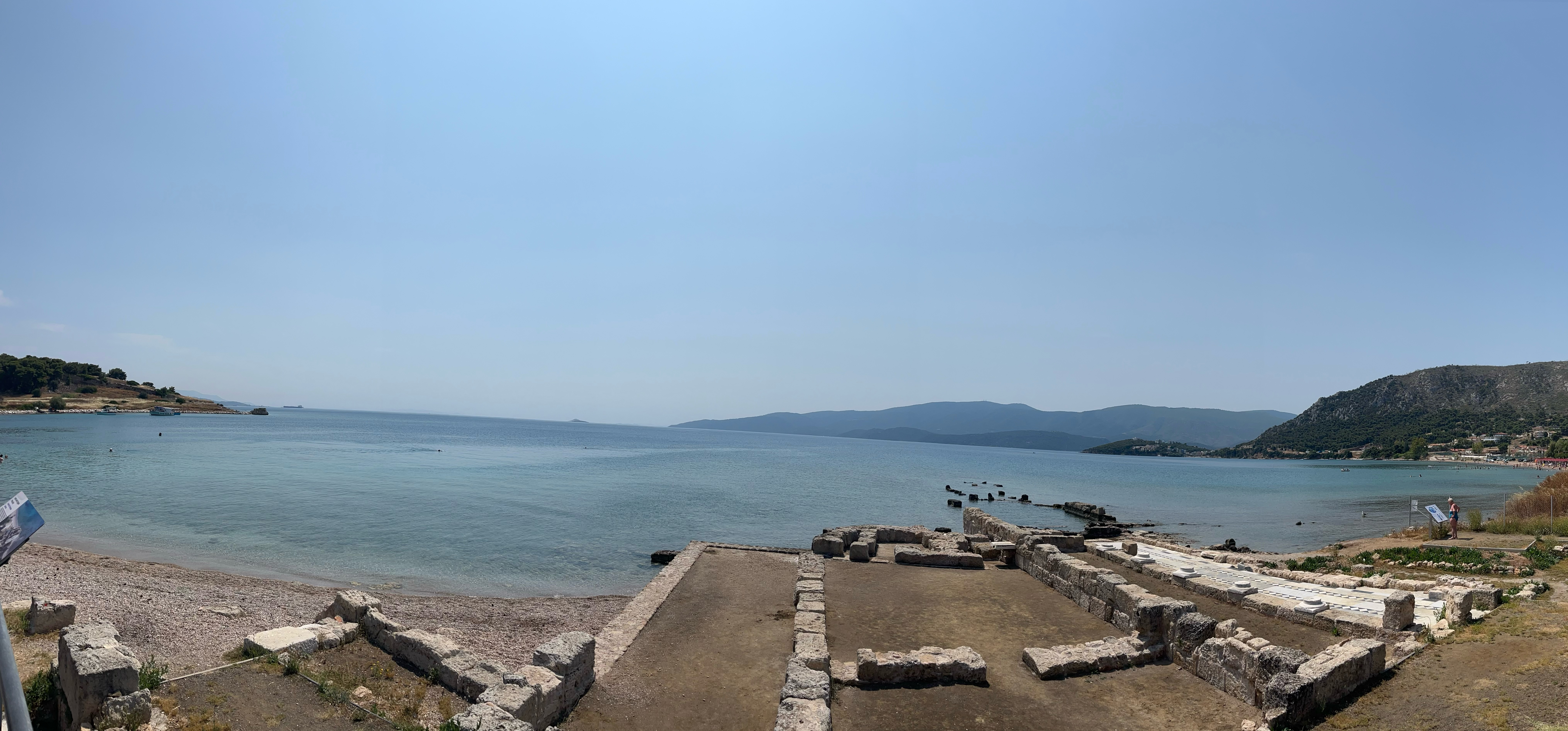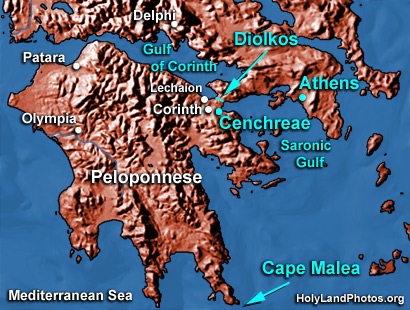Pulling into Cenchrae
The van lurched off the road to the right, and slid into a vacant space at the back of an unmarked gravel parking lot. Our group spilled out of the vehicle and dodged traffic to cross the street. The woman hired as our guide for the day coaxed us to a shaded corner beneath the side of an unmarked building. Around that circle with me were many church planters, partners with the congregation I serve, gathered together on retreat from around the world, and hosted by partners in Greece.

“This,” she announced, spreading an outstretched arm across the horizon, “is the port of Cenchrae.”
Cenchrae is peaceful and picturesque, but there’s not a lot happening there today. Up the beach to the north, ruins from long-gone buildings slope gently into the sea. Those blocks are the last remnants of a waterfront that, thanks to the slow ebb of time, is now mostly underwater. In front of us, beachgoers spread blankets and stake umbrellas, tan, and play in the water.

In the days of the Roman empire this was a bustling seaport. One of the two ports that served the city of Corinth, it’s situated on the eastern side of that narrow strip of land that that connects the Peloponnese peninsula to the Greek mainland, and the Aegean and Ionian seas to each other. This strategic isthmus made Corinth, with its two ports, a busy and prosperous commercial center in the ancient world.
As we took in the scenery and began wandering around the ruins, our guide reminded us, “This was Phoebe’s neighborhood.”
Phoebe
It was at this water’s edge, as she was catching a boat to Rome, that St. Paul would have pressed into Phoebe’s care a letter to be circulated among the growing cluster of churches in that city that we now call the Epistle to the Romans. In the affectionate, extended roll call of greetings that feature in the letter’s final chapter, Paul introduces Phoebe as “a diakonos (“minister,” or “deacon”) of the church at Cenchrae.” He tells the Roman church that she’s “been a prostatis (a “benefactor”) of many and of myself as well.” (Romans 16.1-2)

A prostatis, in Roman society, was a wealthy person who employed their considerable private means for the public good. In that world, it was a great honor to be a benefactor. Indeed, the emperor himself claimed to be the supreme prostatis–the chief benefactor–of the whole Roman state.
As the person bearing the letter we now call the book of Romans, it would have been Phoebe who first read, explained, taught, and answered questions about the epistle she was delivering. Standing together at the Cenchrae shoreline on that sunny afternoon, we were struck freshly by the fact that the first person to read Romans to the embryonic Church in her gathered worship, the first minister to explicate its symphonic theology and unfold its expansive vision of God’s purposes in the world, was this ordained traveling businesswoman in whose neighborhood we stood.
A Global Intrusion of Grace
The women and men exploring the Cenchrae shoreline with me are a picture of the global reach of the Gospel that Phoebe carried with her from that port and taught in the empire’s capital city. I was there that afternoon with my friends Ulises, Lizzie, Mel, Samuel and Mary-Alice–they serve in Havana, ministering in the chaos of a failing government and often-dire living conditions. Antonio and Ruth were there, too, who shepherd a cluster of Presbyterian communities dotting the Yucatan peninsula. And Julio and Olga, veteran church-planters in Lima, Peru. And Alex and Giotis, hosting us as they guide a multiplying family of congregations around Athens. Our friends who I’ll call Justin and Misty were with us, as well–they steward a growing network of underground house-churches in northern Africa.
If you’re like me, it’s easy for life in the Church to feel small, mundane. We wonder if what we’re doing matters, if it’s going anywhere. And we live in a moment in which we’re all constantly being pigeonholed into ideological camps, cultural enclaves, ever-smaller tribes. The concerns of our country and the wider world that blink across our screens seem to continually mount, multiply, and loom.
But this is the beautiful thing. All of us, whether in Cenchrae or the Caribbean, in the first century and on through the twenty-first–we’re all, if we’re claimed by Christ, swept into this vast, sprawling global movement. Whatever our passport, politics, or tax bracket may say, we’re all participants in the irresistible, cosmic intrusion of grace let loose at the empty tomb of Christ.
The Gospel Phoebe carried to Rome has carried on across the world, across the centuries, and is even still “the power of God for salvation for everyone who has faith, to the Jew… and also to the Greek”– and also to the Peruvian, the African, and the Floridian too.


5 Responses
The Word of God has indeed “increased and multiplied” (Acts 12:24)! Thanks for this reminder.
Thanks, Jared, for your reflections on your visit to Cenchreae, which evoked many good memories from my numerous visits there with our family during my sabbatical in Athens and, later, with my Hope College student and alumni tour groups. I hope that you also visited the Diolkos, over which ships were moved from the Gulf of Corinth to the Saronic Gulf (part of the Aegean Sea). Visiting Ancient Corinth brought the New Testament alive for us, as it has for countless other visitors. Your emphasis on the role of Phoebe is excellent. Thank you!
Thanks for your kind words, Jack- and yes, we did get to see the diolkos! It was remarkable watching ships go through there now, and imagine them being carried overland millennia go…
Thank you, Jared. From now on, when I’m reading Romans, you’ll have me thinking of pastor Phoebe as letter carrier and teacher of Paul’s most comprehensive “sermon.” And I’ll be wondering again why, why did we have a church-splitting fight about women in office!
Hi Jared, I was struck by your mention of Julio and Olga serving a church in Lima, Peru. Our daughter, Sarah Baker and her husband, Jose Percar, are starting an incarnational ministry in the barrio, Pamplona Alta San Juan, Lima. Jose grew up there. Their three year old ministry is Inti Ayllu. See website under Modern Day below. They are independent missionaries. Sarah was born in Sierra Leone and studied international community development at Calvin University and Eastern University. I am sure that they would appreciate contacting Julio and Olga. The focus of their ministry is two prong: first a restaurant which will hire young people offering mentorship; the second is a cultural center next to the restaurant providing art, music, tutoring, toddler time, health information and other outside resources for families. The cultural center is still being remodeled. Sarah and Jose are parents to a three year son, our only grandchild. You can contact me at jblupwe2@gmail.com.
Sarah and her son are visiting with us right now to enjoy the Colorado sunshine and outdoors. Thank you so much in advance for getting in touch,
Joyce Baker